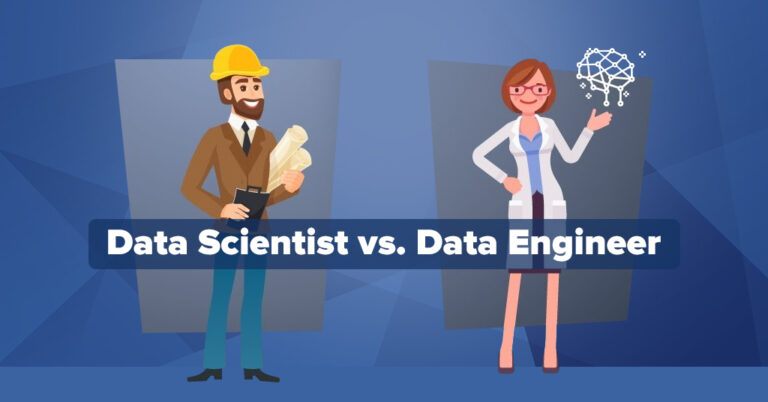Today, organizations are looking for data and data experts to analyze market requirements, explore meaningful insights, predict behavior, and make thoughtful decisions from data. Data engineers and data scientists work as a team to transform raw data in ways that give organizations a competitive edge. But data engineers and scientists have different roles and responsibilities, educational backgrounds, key skills, and pay scales.
Now, when comparing a data engineer to a data scientist, here are some things to consider:
- roles and responsibilities
- educational background
- technical skills
- Employment Outlook and Salary Trends
- top recruiters
roles and responsibilities
Data engineers are involved in various tasks such as data preparation and processing, model development, etc. Generate tests to validate and maintain a complete architecture. They focus on creating a full stack for data collection, storage and processing in real time or batch. They typically use software tools and programming languages to build APIs to process data from large databases in real time.
Data scientists are involved in preprocessing data, discovering hidden patterns, organizing large datasets, answering business queries, and analyzing and interpreting complex data. In addition to this, data scientists perform descriptive statistics and automate models accordingly to meet organizational and customer needs. It also utilizes artificial intelligence and machine learning models to improve prediction, classification and clustering.
| data engineer | data scientist |
|---|---|
| To explore data acquisition opportunities. | Develop a trustworthy operating model. |
| Develop, deploy, test, and maintain data architectures for real-world and large-scale systems. | Conduct surveys to answer organizational and business questions. |
| We use a variety of software tools and scripting languages to tie our systems together. | Find hidden patterns in large amounts of data. |
| Explore new approaches to data acquisition and build new applications for existing data. | Perform data analysis and optimization using artificial intelligence and machine learning. |
| To build pipelines for various ETL operations. | Implementing more advanced analytics programs, performing machine learning and statistical techniques. |
| Data collection, storage and monitoring of data acquisition processes. | Perform descriptive statistics and automate models accordingly. |
| Ensure data accuracy and flexibility. | Build bridges between stakeholders and customers. |
educational background
A data engineer should be a computer science conceptual graduate with a strong academic and analytical background. A data scientist should be an engineering science graduate. Computer, social, and physical plus good control over your stats. However, highly educated people such as M.Tech and Ph.D are preferred at higher levels in the industry. Apart from these foundational academic backgrounds, certifications in the data science field empower a candidate’s profile.
technical skills
Data engineers should have good knowledge of programming languages such as Java, Python, Scala, and JavaScript. Aside from programming languages, you should be familiar with databases such as Oracle, MongoDB, Hadoop, firebase, Hive, DashDB, Cassandra, and MySQL. Data engineers also need deep knowledge of data warehousing, data architecture, ETL, and pipeline processes.
A data scientist’s skills are more analytically oriented compared to a data engineer. A data scientist should have a background in statistics and mathematics. Preferred programming languages include R programming, MATLAB, SAS, Python programming, Julia, and SCALA. You need strong Hadoop-based hands-on analytics, statistical analysis, data mining, and machine learning approaches.

Job prospects and salary trends
Both data engineers and data scientists have great job prospects with attractive salary packages. Various surveys and surveys have been conducted to explore the demand for data science professionals such as:
- According to PWC, there will be a demand for about 2.7 million data science professionals by 2020.
- According to the U.S. Bureau of Labor Statistics, there will be 11.5 million new job openings by 2026.
- Source: Analytics India Magazine [2]
- In 2019, 97,000 jobs are vacant due to the shortage of skilled data science professionals.
- Source: Analytics India Magazine [2]
- Demand for professionals will grow from 364,000 to 2,720,000 in 2020, according to IBM.
- According to Linkedin’s list of the top 15 new jobs in the US, data scientists are growing at 37% and data engineers are growing at 33% annually.[5]

Surveys and studies clearly show that both data engineers and data scientists are in great demand and will continue to be in demand for years to come. Now let’s look at the salary trends for these jobs.
- According to the Dice Salary Report, the average salary for a data engineer is $113,249, while a data scientist is $106,298.
- Glassdoor reported that the average salary of a data engineer is INR 8,59,773 and the average salary of a data scientist is INR 10,27,806.

- The average salary of a data engineer reported by PayScale is INR 8,54,650 and the average salary of a data scientist is INR 8,15,427.

top recruiters
There are several industries with the highest number of job openings for data science professionals, both now and over the past few years.
- Accenture
- Amazon
- KPMG
- Honeywell
- wells fargo
- E&Y
- Dell International
- eClerx Service
- Deloitte
- capgemini
reference :-
- www.datacamp.com
- www.analyticsindiamag.com
- www.techhub.dice.com
- www.data-flair.training
- www.linkedin.com
- www.insights.dice.com
- www.glassdoor.co.in
- www.payscale.com



